The King of the Sea Monkeys is a novel of two parts. The first part is about Paul, a young high school teacher, a loving father to Jessie and husband to Lilian. The second part is about Saul, whom Paul “becomes” after surviving a gunshot to the head upon being thrust into the middle of a gas station robbery. Wrong place, wrong time, and just like that, Paul becomes Saul. Continue reading “The King of the Sea Monkeys”
NewPages Blog
At the NewPages Blog readers and writers can catch up with their favorite literary and alternative magazines, independent and university presses, creative writing programs, and writing and literary events. Find new books, new issue announcements, contest winners, and so much more!
The King of the Sea Monkeys
Spread the word!
Baby’s on Fire
Running beneath each story in Liz Prato’s collection, Baby’s on Fire, is a murmuring chaos, the kind that seems to bubble beneath the surface either as the aftermath of or building up to a full-blown eruption. But those eruptions never come to readers in the span of the narratives. They’ve already happened, or this story is the building up to it, or it may never happen at all, and what we witness in these lives is precisely what we witness in the lives of people who surround us on a daily basis. Whole lives lived, the full details of which we have absolutely no awareness, but that simmer there, just below the surface. Just like our own lives in relation to others. Continue reading “Baby’s on Fire”
Spread the word!
Testament
“The body as sculpture,” Testament—G. C. Waldrep’s book-length poem—begins, and with it we feel the steadying gesture that prefaces any great feat—fingers at one’s temples, eyes closed, the breath held. Continue reading “Testament”
Spread the word!
My Pulse Is an Earthquake
FitzPatrick’s debut collection, published by the Vandalia Press imprint of West Virginia University Press, consists of nine powerful stories about the fragility of hope, the devastation of grief, and the precarious balance of family harmony that lies between the two. Four of the nine stories feature the same characters, allowing us to see growth, and sometimes the lack thereof, in the lives of these individuals. Continue reading “My Pulse Is an Earthquake”
Spread the word!
Deer Hour
Even before turning the first page of Khaty Xiong’s beautifully composed chapbook Deer Hour, we are given a visual clue as to what we’ll find inside. The cover image shows a large and noble buck suspended between an expanse of grey sky above and yellow field below. The animal, balanced between the two seemingly endless landscapes, defies and resists enclosure. Much the same way, Xiong’s poems refuse to be confined to definitive beginnings and endings, and instead hover, suspended on each page. Continue reading “Deer Hour”
Spread the word!
Hybrid Moments
“Been working on my abstractions now / for over a lifetime” is the very opening line of the book. This line holds true through the duration of Jon Curley’s Hybrid Moments,which is of the school that plain language ought to be reserved for journalism. Though it is a modern work, influenced by much in the contemporary realm, it rings in the manner of the classic romantics. The language is ornate and the thoughts are powerful. There are many threads that must be teased from one another. Continue reading “Hybrid Moments”
Spread the word!
Partisans
Author Geoffrey Peerson Leed is a voice from the future. Other than a webpage issued by The Market Optimization Bureau labeling him “subversive,” there is his “lost work” Partisans. Leed too is a “ghostly neighbor” whose fate is unknown. M. Allen Cunningham is responsible for the book’s publication, presented in accordance with the author’s wishes “as indicated in manuscripts discovered after his disappearance.” Readers who favor either the political dystopias of Orwell or the zombie-apocalypse works of Max Brooks will be interested in what Leed has to say. Continue reading “Partisans”
Spread the word!
I Was Not Born
When I finished Julia Cohen’s I Was Not Born I had the following reactions, more or less simultaneously: That really ends with a punch. I am not so sure what just happened there. I want to try something like this. Even from the first paragraph of the first essay, I knew that this was not going to be a traditional project. Continue reading “I Was Not Born”
Spread the word!
Willow Springs 2015 Fiction Prize Winner
 Carissa Halston’s “Call It a Map” has been awarded the 2015 Willow Springs Fiction Prize of $2000 and publication in issue #76. Halston offers insight on the winning story: the Craigslist ad that inspired the concept, her signing up for a sleep study and researching disabilities. She writes of the piece, “I wanted to push sensory details as far as I could without relying on imagery, which meant I was allowed to choose similes and metaphors that wouldn’t fly in another story. All stories rely on internal logic, but I find the most cohesive narratives are those that use their plot details to inform their diction.” Read the story and more from Halston here.
Carissa Halston’s “Call It a Map” has been awarded the 2015 Willow Springs Fiction Prize of $2000 and publication in issue #76. Halston offers insight on the winning story: the Craigslist ad that inspired the concept, her signing up for a sleep study and researching disabilities. She writes of the piece, “I wanted to push sensory details as far as I could without relying on imagery, which meant I was allowed to choose similes and metaphors that wouldn’t fly in another story. All stories rely on internal logic, but I find the most cohesive narratives are those that use their plot details to inform their diction.” Read the story and more from Halston here.
Spread the word!
Glimmer Train Short Story Award for New Writers :: 2015
Glimmer Train has just chosen the winning stories for their May Short Story Award for New Writers. This competition is held quarterly and is open to all writers whose fiction has not appeared in a print publication with a circulation greater than 5000. The next Short Story Award competition will take place in August. Glimmer Train’s monthly submission calendar may be viewed here.
 1st place goes to Lauren Green [pictured] of New York, NY. She wins $1500 for “When We Hear Yellow” and her story will be published in Issue 97 of Glimmer Train Stories. This will be her first publication.
1st place goes to Lauren Green [pictured] of New York, NY. She wins $1500 for “When We Hear Yellow” and her story will be published in Issue 97 of Glimmer Train Stories. This will be her first publication.
2nd place goes to Emory Harkins of Brooklyn, NY. He wins $500 for “We’re Talking to Ourselves.”
3rd place goes to Ellen Graham of Seattle, WA. She wins $300 for “Livingston.”
A PDF of the Top 25 winners can be found here.
Deadline today for the Very Short Fiction Award: July 31. This competition is held quarterly, and 1st place wins $1500, publication in the journal, and 20 copies of that issue. It’s open to all writers, with no theme restrictions, and the word count must not exceed 3000. Click here for complete guidelines.
Spread the word!
Some Literary News Links :: July 2015
Molly Lynch give us 10 books to entertain, inspire and encourage young feminists – agree? disagree?
150 Years of Wonderland is on exhibit at The Morgan Library & Museum, with an online exhibition available for mouse click travelers.
Follow that up with Anarchy in Wonderland: Vivienne Westwood’s anti-capitalist take on Alice’s Adventures on NewStatesman.
Washington Post’s Valerie Strauss examines Common Core and Martin Luther King Jr.: Is this any way to teach his famous letter from jail?
What do Americans look like in Arabic literature? Columnist Marcia Lynx Qualey @arablit explores Portraits of Americans in Arabic literature.
I could have used a couple of these when I first began smartphone reading: 5 Tips for Reading Serious Literature on Smartphones.
And Dartmouth College is running a contest to see what artificial intelligence can create the most human-like writing and music entries.
Spread the word!
NER Focus on China
Volume 36.2 of New England Review includes a Focus on China, with first English translation of poems by Xiao Kaiyu, Ya Shi, and Yin Lichuan; Wei An’s ruminations on nature just north of Beijing; Wendy Willis on Ai Weiwei’s blockbuster show at Alcatraz; and fiction by Chinese-born American writer Michael X. Wang.
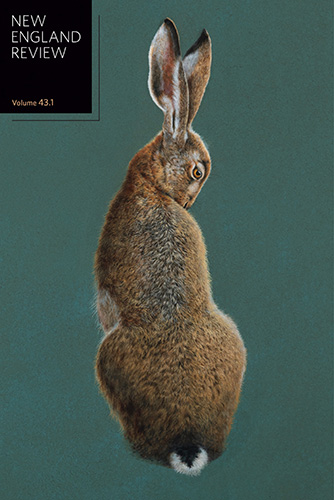 Editor Speer Morgan writes in his Editor’s Note: “At NER, the door has always been open to translations, from any language, but Chinese literature has been missing from our pages since 1987, when we published David Hinton’s rendition of classical Chinese poet Tu Fu. So for this issue we reached out in order to bring more of it in. We’ve assembled a handful of contemporary works translated from Chinese as well as works pertaining to China written in English. This is not an attempt to present some kind of overview—not at all—but rather we’re doing what NER does best, that is, offering a lively sample of what’s new and good. They’re presented not as a discrete section but are integrated into the issue as a whole, because it turns out that the China-related pieces in this issue speak just as often, and sometimes more clearly, to the other works assembled here as to each other.”
Editor Speer Morgan writes in his Editor’s Note: “At NER, the door has always been open to translations, from any language, but Chinese literature has been missing from our pages since 1987, when we published David Hinton’s rendition of classical Chinese poet Tu Fu. So for this issue we reached out in order to bring more of it in. We’ve assembled a handful of contemporary works translated from Chinese as well as works pertaining to China written in English. This is not an attempt to present some kind of overview—not at all—but rather we’re doing what NER does best, that is, offering a lively sample of what’s new and good. They’re presented not as a discrete section but are integrated into the issue as a whole, because it turns out that the China-related pieces in this issue speak just as often, and sometimes more clearly, to the other works assembled here as to each other.”
Spread the word!
Books :: Flannery O’Connor Award for Short Fiction
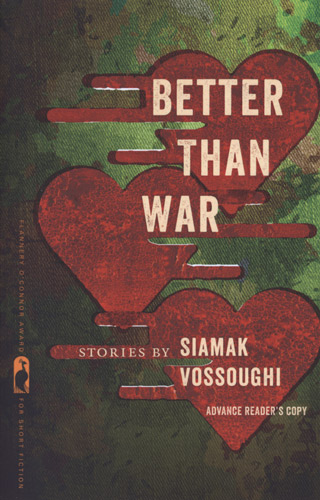 Since 1983, the University of Georgia Press has annualy held their Flannery O’Connor Award for Short Fiction, which, according to their website, “was established to encourage gifted emerging writers by bringing their work to a national readership.” Siamak Vossoughi’s winning collection Better Than War will be published in September 2015.
Since 1983, the University of Georgia Press has annualy held their Flannery O’Connor Award for Short Fiction, which, according to their website, “was established to encourage gifted emerging writers by bringing their work to a national readership.” Siamak Vossoughi’s winning collection Better Than War will be published in September 2015.
From the publisher’s description: “The stories in Better Than War encompass narratives from a diverse set of Iranian immigrants, many searching for a balance between memories of their homeland and their new American culture. [ . . . ] All Iranian immigrants, young or old, carry with them a vivid past in their contemporary life. Vossoughi’s Better Than War is about growing up, coming of age, and raising children in America while still remembering the importance of retaining Iranian pride.”
Preorder your copy of Better Than War at the University of Georgia Press website.
Spread the word!
New Editors @ Beloit Poetry Journal
With little fanfare, John Rosenwald and Lee Sharkey have stepped down as The Editors of Beloit Poetry Journal, roles they have held for nearly 25 years.
The publication has a long and romantic history – starting up at Beloit College, declaring its independence to defy the opinions of those who would censor it, and moving from Wisconsin to Maine while keeping its place-based name, establishing an international reputation for contemporary poetry. Writers speak of ‘not being ready yet’ to submit to BPJ, but someday, they will; or of being rejected, they smile – as though accomplishing the attempt was enough (and they always say, “I got the nicest rejection…”). Sigh. There just aren’t many such stories as those nowadays with the revolving door of publication start ups and closures, hundreds of lit mags to submit to, mass submission processes where writers don’t even know the publications they’ve sent work to.
Beloit Poetry Journal’s history is a good read and reminder of the literary journals that paved the way for so many others. And not just publications, but the people involved with them: editors, readers, writers, publishers. All of us.
Having known John and Lee (and Ann Arbor) for well over a decade now, I know this decision to pass on the publication was not an easy one. Please readers, understand, it was within their power to end Beloit Poetry Journal and call it a good run. Stepping away is hard enough, but handing over a publication with such an incredible reputation was not so much a decision as a process that took several years to come through. My appreciation and admiration to John and Lee and Ann for all of their hard work and dedication to writers AND readers. They never separated the importance of those two roles through the years they ran the journal, which is what makes it so well known today within the literary community.
I see John and Lee are still listed in the publication as “Senior Editors,” so I’m sure they will continue on in some advisory capacity. But I have also met the new editors: Melissa Crowe and Rachel Contreni Flynn. I know they will look to their Senior Editors in the years to come to guide them, but I already sense that they will have strength and creativity of their own to take the journal into the next great phase of its existence.
Melissa and Rachel provide a short note about the transition here. I like how in it, and elsewhere on the site, the role of Editor is referred to as handling the day-to-day operations of the journal. But as the literary community had come to know first David and Marion Stocking, then John Rosenwald, Lee Sharkey, and Ann Arbor as the face(s) of Beloit Poetry Journal – there is a great deal more responsibility to being the Editor of a journal than simply running the day-to-day. That day-to-day may actually feel like the work of it all, but much more than that is required to maintain a good literary publication. A great literary publication. One of the best.
The tangible, the day-to-day, that will be the easy part. It’s the other, the expectations, that become the true responsibility. The expectations of writers, of readers, of other editors, other publications, of teachers, of students, of the up-and-coming, of the established, of yourselves – most of all – of yourselves. Continually satisfy these changing expecations of the collective imagination, sustain this, and you will have a publication people know internationally. For decades. It has been done. It can be done.
My best to Melissa and Rachel. No cliches about shoes to fill. You have already done that or you wouldn’t be here already. Ten years from now, let’s look back, talk about where Beloit Poetry Journal has been and imagine where you see it going.
Spread the word!
Big Muddy 2014 Contest Winners
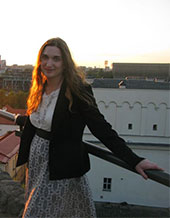 Big Muddy: A Journal of the MIssissippi River Valley issue 15.1 features winning entries from their 2014 contests:
Big Muddy: A Journal of the MIssissippi River Valley issue 15.1 features winning entries from their 2014 contests:
Wilda Hearne Flash Fiction Contest
Jeannine Dorian Vesser, Missouri, “That Summer”
Mighty River Short Story Contest
Hannah Gildea [pictured], Oregon, “Cottonmouth”
2014 contest winners for full-length works to be published by Southeast Missouri State University Press include:
Cowles Poetry Book Prize
Angie Macri, Underwater Panther
Publication Date: September 1, 2015
Nilsen Literary Prize for a First Novel
James Tate Hill, Academy Gothic
Publication Date: October 1, 2015
Spread the word!
The Masters Review 2015 Anthology
 The Masters Review volume IV features ten authors whose stories were selected by Kevin Brockmeier [pictured] as “The Best Stories by Emerging Writers.” The Masters Review has two submission periods per year, one for new voices published online, and the print anthology, which in the past was open to just those in graduate-level programs.
The Masters Review volume IV features ten authors whose stories were selected by Kevin Brockmeier [pictured] as “The Best Stories by Emerging Writers.” The Masters Review has two submission periods per year, one for new voices published online, and the print anthology, which in the past was open to just those in graduate-level programs.
This year’s anthology opened to submissions “from emerging writers of all kinds.” Editor Kim Winternheimer writes, “As The Masters Review grows in its literary pursuits, its focus remains on celebrating and promoting new and emerging authors. Yet, by showcasing writers from a single demographic we were limiting our platform. As we mark our fourth year, we are thrilled to embrace a growing range of voices.”
Winternheimer comments that while nonfiction entries were submitted, none were selected for this final colletion, making this anthology an all-fiction issue. Authors and works included can be found here, as well as a link to the shortlist of finalists.
Spread the word!
New Lit on the Block :: Crab Fat Literary Magazine
Rounding out its first year of publication, Crab Fat Literary Magazine has four print issues (August, November, February, May) and a ‘best of’ anthology in addition to its online collection from posting new writing every other Sunday of the year.
Founding/Managing Editor Caseyrenée Lopez and Fiction Editor Ella Ann Weaver oversee the publication of fiction, creative non-fiction, poetry, flash fiction, interviews, art/photography, and experimental/hybrid work. They will consider audio/video of readings, but it’s not something they’ve published regularly.
The motivation for starting CFLM, Caseyrenée tells me, was “to join the conversation. My educational background is focused on queer writing/publishing, and supporting minority voices was the next step for me. I also wanted to see what was out there; starting Crab Fat has provided me with interactions and experience I wouldn’t have gained otherwise.”
Most intriguing to me is that name – Crab Fat. Where on earth did that come from? Caseyrenée says, “I wanted something memorable and cool, but was struggling to find something that would vibe with my goal of highlighting awkward/experimental/queer prose and poetry. A few days before I committed to buying a domain, my husband and I were at breakfast and started calling out random phrases and obscure words. He suggested ‘crab fat’ because we’d been listening to Crudbump‘s Illuminati Shit. Our favorite line in the song is ‘rock a big gut, that’s my crab fat’ and we’d been making jokes about his chubby belly being ‘crab fat.’ So really, the name Crab Fat is a weird mashup of rap lyrics and body positivity.”
In keeping with the unique name, readers can expect to find “a little bit of this and a little bit of that,” Caseyrenée tells me. “We feature a wide variety of voices and offer an eclectic mix of contemporary content. We are progressive and like to publish work that goes against the grain of mainstream.” To that end, during their first year CFLM has featured writing from Adam Kuta, Edward A. Boyle, D.S. West, Haley Fedor, Alana I. Capria, Philicia Montgomery, and Susannah Betts.
The future for CFLM will include pushing the genre limits and incorporating more experimental work into the magazine. “We want work that breaks conventions and makes us question what we know about genre” says Caseyrenée, “so we are actively reaching out to a wider audience than before. We are also trying to raise money through tip-jar submissions, a GoFundMe campaign, a cool image prompt contest, and sales of our print anthology. We want to pay writers for their work, even if it is just a token payment, to show that we appreciate all of their hard work.” Crab Fat also actively works to recognize writers through nominations for the Pushcart Prize and Best of the Net.
CFLM’s print anthology is published under the Damaged Goods Press imprint. Caseyrenée is the founder of both, so in a sense, they’re sister sites/publications. The quarterly magazine is available as PDF and print, and the every other Sunday installments on available online. Submissions are accepted a rolling basis using Submittable.
Spread the word!
Ruminate 2015 Nonfiction Winners
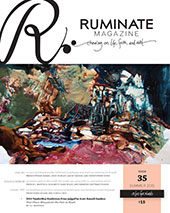 Ruminate Summer 2015 includes the first and second place winners and the honorable mention of the 2015 VanderMey Nonfiction Prize judged by Scott Russel Sanders.
Ruminate Summer 2015 includes the first and second place winners and the honorable mention of the 2015 VanderMey Nonfiction Prize judged by Scott Russel Sanders.
First Place
D.L. Mayfield for Blessed are the Pure in Heart
Second Place
Elizabeth Dark Wiley for “If you Want it to Last…”
Honorable Mention
Shannon Huffman Polson for Naked: A Triptych
Spread the word!
Drunken Boat Book Contest Winner & Finalists
Drunken Boat #21 includes work from each of the finalists for the DB Book Contest. The contest was opened to opened to poetry, translations, and hybrid works. The editors received nearly 300 manuscripts which were narrowed down to 10 finalists. Forrest Gander chose the winner of the contest: Collier Nogue’s The Ground I Stand on is Not My Ground, a book that utilizes QR codes that link up to a website to create a truly immersive multimedia experience.
The finalists contest: Diana Thow translating Amelia Rosselli; Eleanor Goodman; Amaranth Borsuk and Gabriela Jauregui; Amy Pence; Catherine Hammond translating Carmen Boullosa; Collier Nogues; Elisabeth Murawski; Haley Larson; Meredith Stricker; Michael Leong; and Stephanie Anderson.
Samples of their work can be read on Drunken Boat #21 here.
Spread the word!
SHR Auburn Witness Poetry Prize
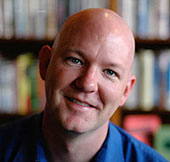 The newest issue of Southern Humanities Review (v48 n4) includes a special poetry section featuring the winner, runners-up and finalists for the 2014 Auburn Witness Poetry Prize honoring Jake Adam York (pictured; 1972-2012).
The newest issue of Southern Humanities Review (v48 n4) includes a special poetry section featuring the winner, runners-up and finalists for the 2014 Auburn Witness Poetry Prize honoring Jake Adam York (pictured; 1972-2012).
WINNER
Amanda Gunn
Gunn was the guest of honor at “Abide”: A Tribute to Jake Adam York and His Work, October 2014.
RUNNERS-UP
Julia Kolchinsky Dasbach
Shara Lessley
FINALISTS
Lauren Camp
Kai Carlson-Wee
Joshua Gage
Jennifer Horne
Jeremy Keenan Jackson
Anna Leahy
Enid Shomer
David Tucker
Seth Brady Tucker
Richard Tyler
Spread the word!
The Fiddlehead Summer Fiction Issue
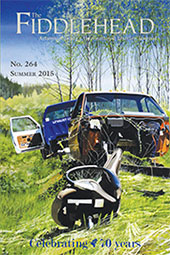 I couldn’t help but to share this snippet from Mark Jarman’s editorial remarks for the summer fiction issue of The Fiddlehead (n264):
I couldn’t help but to share this snippet from Mark Jarman’s editorial remarks for the summer fiction issue of The Fiddlehead (n264):
I will be brief: this is an amazing collection, an astounding summer fiction issue. Look at the stories and writers from around the globe, writers new and proven: no one else in Canada can touch what we are doing right now.
There I’ve said it; the gods of the small mags can strike me down.
Rather than being struck down, I hope this encourages readers to take look (a couple can be read full text online) and judge for themselves!
Spread the word!
New Lit on the Block :: Polychrome Ink
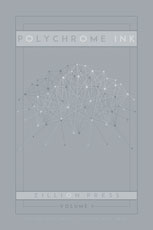 Polychrome Ink is a new biannual print and e-published journal with the mission to highlight that diversity is not a niche market, but a mass market.
Polychrome Ink is a new biannual print and e-published journal with the mission to highlight that diversity is not a niche market, but a mass market.
“Polychrome Ink is run by a group of diverse friends,” Executive Editor Em Salgado explained to me. “We met due to a mutual love of literature. During frequent literary discussions, we often noticed a shortage of characters that represented any of our individual diversity points, which only further highlighted what we felt was lacking. The need to see ourselves normalized in the literature being produced and the literature we love became our raison d’être. Eventually we grew tired of simply talking about it and decided to take matters into our own hands.”
At the editorial helm along with Em are Associate Editor Zire Fournier, Copy Editor Kimmia Masterson, and Assistant Associate Editor Zaira Fournier. Additionally, Polychrome Ink currently has eight specialty editors who assist with topics and themes in which they have experience. For example, if Polychrome Ink receives a submission with any of the following themes: gay male, genderqueer, religious, neuroatypical — the editors send that submission to Aaron for review because he, himself, is a gay neuroatypical genderqueer individual who studies theology.
Unique to this publication, writers who submit may choose the editor that they feel best suits their work. Em explained, “The process of selecting an editor with the appropriate diversity points and literary interests helps to assure writers that their submission is being reviewed by someone that their work will resonate with the most — thus making the relationship between writer and editor more personal.”
Even the name Polychrome Ink speaks to the diversity of the publication: “We were looking for a moniker that represented diversity,” Em said, “and by extension, diversity in writing. Polychrome means multicolored, yet does not have the same connotation as rainbow, since our demographic extends beyond LGBTQIA+ themes. And Ink, of course, represents the writing itself.”
Readers of Polychrome Ink can expect to find a collection of short fiction, creative nonfiction, flash fiction, essays, and poetry written by diverse authors and/or with diverse themes. Em explains that “Polychrome Ink seeks to share authentic voices and quality literature, covering an array of genres and topics, with the hopes that the work resonates with readers.”
For their inaugural issue, the featured author was Tessa Gratton, alongside Emma Mauze, Frances Kimpel, D. Michael Warren, Shana Bulhan Haydock, David Perlmutter, Yuan Changming, Anders Scott, Jan Steckel, Robin Wyatt Dunn, Courtney Hamel, Kim Luna, Jaycee Boydgarcia, Alex Franco, Malcolm Friend, and Stephen Mead.
“In terms of the future,” Em told me, “we will continue providing an outlet and resource for writers and readers alike. We would like to be amidst the publications everyone looks to for original diverse literature. We also have plans to expand our staff — thus broadening the diverse spectrum of our editorial team.”
Polychrome Ink accepts submissions via email and is approaching the end of the submission period for Volume II — which releases in October. (Submissions close July 31.) There is no reading fee and the publication is a paying market with hopes that as readership grows, so will the compensation to writers.
Spread the word!
Poem :: Sara Marron and Michael Reich
 The Lucy cell
The Lucy cell
the stock exchange creating a consciousness
the computer, functioning on man-made algorithms
corrects its own mistakes
error-correction is a sign of
(to a computer)
a sign of its own conscious
its own identity…
From [Language] CSS and HTML [/Language] by Sara Marron and Michael Reich
Chagrin River Review, Issue 6 (Spring 2015)
Spread the word!
Flash Fiction :: Kelly Charlton
As I head into my “summer off” I can honestly say I appreciate this hardcore look at teaching. I’ll use this as my retrospective for the month:
“At age 26, your first teaching assignment shattered your dreams. Your students preferred other forms of entertainment such as talking on their cell phones or discussing who was sleeping with whom to studying Shakespeare and dangling participles. Most had no clue how to express themselves using a complete sentence, and if you’d had a whisky shot for every time you read an essay containing the word ‘cuz,’ you would have become a fine drunk, which in retrospect doesn’t sound so bad.”
From “A Guide for the Burned Out Teacher” by Kelly Charlton published in Crab Fat Literary Magazine online content, July 2, 2015.
Spread the word!
MFA Attitude Adjustment
 Amidst all the debate about the “value” of higher education and the “overabundance” of MFAs being turned out of programs these days, it was refreshing to read Charlotte Morganti’s Eight Reasons to Considering Pursing an MFA on Fiction Southeast. What a great reminder that it’s okay to want to go to school to LEARN not just to EARN. Morganti writes, “Initially I enrolled in my MFA program for two reasons – to learn the craft and to hang out with some really cool people. By the time I earned the degree, I had benefited in many other ways as well.” She invites readers in or pursuing MFAs to give their own reasons for enrolling in a program, as well as responses to these two questions: Did your MFA give you benefits you dind’t expect when you first enrolled? If you opted no to pursue and MFA, what were your primary reasons?
Amidst all the debate about the “value” of higher education and the “overabundance” of MFAs being turned out of programs these days, it was refreshing to read Charlotte Morganti’s Eight Reasons to Considering Pursing an MFA on Fiction Southeast. What a great reminder that it’s okay to want to go to school to LEARN not just to EARN. Morganti writes, “Initially I enrolled in my MFA program for two reasons – to learn the craft and to hang out with some really cool people. By the time I earned the degree, I had benefited in many other ways as well.” She invites readers in or pursuing MFAs to give their own reasons for enrolling in a program, as well as responses to these two questions: Did your MFA give you benefits you dind’t expect when you first enrolled? If you opted no to pursue and MFA, what were your primary reasons?
Spread the word!
World Literature Today – May-August 2015
The current issue of World Literature Today is a double issue that assures us a broader variety than usual. The expected material is itself several evenings of very enjoyable reading, but the content of this issue does literally have something for everyone. And there’s far more than a short review can hope to do justice, even without examples and quotes. Continue reading “World Literature Today – May-August 2015”
Spread the word!
Concho River Review – Spring 2015
Concho River Review is a traditional literary magazine, offering the old-fashioned pleasures of text and comprehensibility under the motto “Literature from Texas and beyond.” Published twice a year in paperback by Angelo State University, and part of the Texas Tech University System, the contents are mostly from Texas, with little from beyond. They are neatly arranged in sections for fiction, nonfiction, poetry, and book reviews, with roughly equal amounts of each, with no graphics or artwork.
Continue reading “Concho River Review – Spring 2015”Spread the word!
The Georgia Review – Spring 2015
The Georgia Review is a venerable fixture on the American literary scene, and a magazine entrenched in the academic world. Founded in 1947 at the University of Georgia in Athens, Editor Stephen Corey is equally venerable, having joined the magazine in 1983. According to their website, “The Georgia Review seeks a broad audience of intellectually open and curious readers—and strives to give those readers rich content that invites and sustains repeated attention and consideration.” Continue reading “The Georgia Review – Spring 2015”
Spread the word!
Border Crossing – Fall 2014
Smaller journals are vulnerable to becoming just another magazine in the ever-expanding literary world. It is up to the individual journals themselves to find a way to separate their art from the countless others in circulation. Border Crossing, now four issues old (founded in 2011), appears to embrace this challenge and continues to deliver high-quality work while experimenting with unique features such as their “Michigan and Ontario” section. Continue reading “Border Crossing – Fall 2014”
Spread the word!
A Public Space – Winter 2015
A Public Space fits neatly into my hands with its fine matte finish and folded flaps for bookmarks (in case there are no café receipts handy). The shade of magenta coordinates warmly with Lee Satkowski’s photograph—a writer in his studio, mosquito net surrounding his workspace, 50s checkered tile below his feet—providing a vibe that one would find in a coffee shop in Williamsburg. Its cream-colored pages are easy on the eyes, making it an ideal read under the sun or florescent lighting. Although designed with an aesthetic I am partial to, A Public Space provides content that fits neatly into your palms, but untidily in memory. Continue reading “A Public Space – Winter 2015”
Spread the word!
Profane – Winter 2014
Weirdness attracts weirdness, unless of course, you are the kind of reader that is repulsed by the idea of dinosaur pornography written by an elementary-aged girl. (More on Benjamin Drevlow’s story later.) I am not that kind of reader, and neither are the editors of Profane. This journal aims to unsettle minds and bring to the page tales that are, “sacred, profound, heartfelt, raw, quirky, and, at times, a little weird.” Aside from its peculiar content, Profane also includes a raw soundtrack of the authors reading their work on its website. Not all writers are professional recording artists which makes listening to the text all that more interesting as the “authors’ very lives have bled into these tracks.” Continue reading “Profane – Winter 2014”
Spread the word!
The Iowa Review – Spring 2015
The Iowa Review encompasses texts of the America we assume we know—strong and prideful. Yet, I read about an America whose citizens felt a series of words not synonymous with “strong” or “prideful,” but with “confused” and “defeated.” These American writers (or are they? as some questioned) trudged through turmoil on both native and foreign soil, both within themselves and with the world to compose these words that form a nation of misidentification. Continue reading “The Iowa Review – Spring 2015”
Spread the word!
Atlanta Review – Spring/Summer 2015
In autocratic regimes, it is not uncommon for freedoms of speech and expression to be suppressed. Social media, newspapers, the arts, and other forms of creative expression threaten the authority of governments which work by subduing the voices of many in order to amplify the voice of one. But as recent history has shown—from the Twitter Revolution and Arab Spring in the Middle East to the Euromaidan Revolution in Ukraine—the people’s voices cannot be silenced, their art cannot be forgotten, and their words cannot be erased. Artists and writers, the forces of social change, still manage to exist in places that would rather they didn’t. Continue reading “Atlanta Review – Spring/Summer 2015”
Spread the word!
Ninth Letter – Spring/Summer 2015
When I first received this issue of Ninth Letter, I was curious to why it came with a box cover. Upon removing it from its sheath, I found that it came with three card inserts, each one a prose piece dedicated either to the waning Dewey decimal system, an immature book defacer, or a “Library of Water.” After reading the prose inserts, I was excited to read further. Once I opened the issue I was greeted by a myriad of art pieces of different sizes, styles, meanings; a smorgasbord of colors and patterns that would take their own review to cover in any detail, which, as a previous art student, I was tempted to write. Continue reading “Ninth Letter – Spring/Summer 2015”
Spread the word!
Redivider – 2015
When I first picked up this issue of Redivider, I found myself engrossed in the cover art by Patricia Mera. I spent what felt like hours tracing the lines and curves of a red tendril, trying to imagine if it was an arm or an artery, or if the stacked red pyramids resembled anything in particular. In an interview with the artist, printed at the back of the issue, Mera said that she titled the piece “Natural Thoughts” because “of how natural the shapes and order of images came to me.” I felt the title suited the piece perfectly, as my thoughts were repeatedly drawn to nature. Continue reading “Redivider – 2015”
Spread the word!
Moss – Summer 2015
The triannual, online Moss is “dedicated to bringing Northwest literature to new audiences and exposing the emerging voices of the region to discerning readers, critics, and publishers.” What better way to do this than by opening the Spring 2015 issue with an interview with Rebecca Brown, a Seattle-based writer? Continue reading “Moss – Summer 2015”
Spread the word!
The Cossack Review – Spring 2015
The Cossack Review is a publication that demands readers enter with a mind truly open to the unexpected and nonconformist. “Transit” is the theme of this issue, and Editor Christine Gosnay says they have selected works from writers “who create strange, overgrown worlds in clean and controlled ways, making transit through those worlds a rich and realized journey.” Well, okay, let’s see then. Continue reading “The Cossack Review – Spring 2015”
Spread the word!
Graphic Narrative: Emily Steinberg
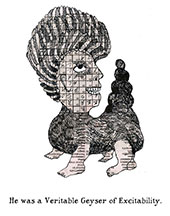 “First sort through Emily Steinberg’s A Mid Summer Soirée in quick succession,” writes Tahneer Oksman, Graphic Narratives Reviews Editor of Cleaver Magazine, “Then go back and read it slowly.”
“First sort through Emily Steinberg’s A Mid Summer Soirée in quick succession,” writes Tahneer Oksman, Graphic Narratives Reviews Editor of Cleaver Magazine, “Then go back and read it slowly.”
I did just that, and found that as I progressed through the images with accompanying text, I became more and more amused by the story of each whimsical character.
“He thought his Linen Suit was the way to go.”
“She wondered if her new Coif was appropriate for an evening soiree.”
“He’d received the invite only a day before and felt decidedly B-listed.”
There’s no transition to connect the images and stories to one another, other than the overall title. As Oksman writes, “Trying to fill in the narrative gaps is part of the pleasure of the journey, as is, on the contrary, moving past those gaps in favor of experiencing the piece’s seductive rhythm.”
Going back through it slowly allows time to absorb the artwork, which is fantastic collage/sketch design work. Using newspaper, with lots of crosswords sections, some of Steinberg’s images have almost an exquisite corpse feel to them that makes it both disconcerting and impossible to look away.
Spread the word!
Need a Prompt? Try These!
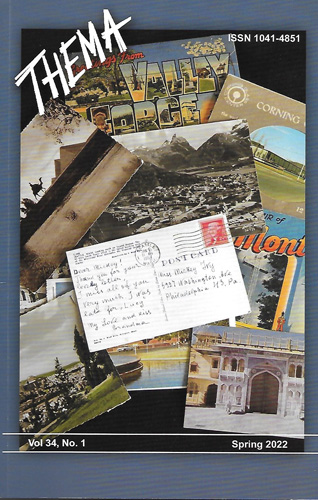 Looking for an idea to get your writing started today? Try THEMA literary journal! Each issue of THEMA is based on a different unusual theme. The journal is designed to provide readers with a unique and entertaining collection of artistic theme interpretations, in the form of stories, poetry, black-and-white artwork, and photography. It also provides a stimulating forum for established and emerging literary artists and serves as source material and inspiration for teachers of creative writing.
Looking for an idea to get your writing started today? Try THEMA literary journal! Each issue of THEMA is based on a different unusual theme. The journal is designed to provide readers with a unique and entertaining collection of artistic theme interpretations, in the form of stories, poetry, black-and-white artwork, and photography. It also provides a stimulating forum for established and emerging literary artists and serves as source material and inspiration for teachers of creative writing.
Upcoming themes and dealines for submission:
The Neat Lady and the Colonel’s Overalls
November 1, 2015
Drop the Zucchini and Run!
March 1, 2016
Second Thoughts
July 1, 2016
“The premise given,” the editors write, “must be an integral part of the plot, not necessarily the central theme but not merely incidental.” For more information, visit THEMA.
Spread the word!
Chariton Short Fiction Prize Winners
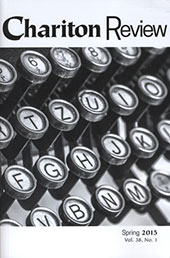 The Spring 2015 issue of Chariton Review features the winner and finalists of their 2015 Short Fiction Prize, judged by Christine Sneed. This winner of this annual award for the best unpublished short fiction on any theme up to 5,000 words in English receives a prize of $500 and two or three finalists will receive $200 each. All U.S. entrants will receive a complimentary copy of the Spring prize issue in which the winners are published.
The Spring 2015 issue of Chariton Review features the winner and finalists of their 2015 Short Fiction Prize, judged by Christine Sneed. This winner of this annual award for the best unpublished short fiction on any theme up to 5,000 words in English receives a prize of $500 and two or three finalists will receive $200 each. All U.S. entrants will receive a complimentary copy of the Spring prize issue in which the winners are published.
2015 Winner
“Sugar Bowl” by Jo DeWaal
Finalists
“Delivery in Göteborg” by Mike Lewis-Beck
“Die Laughing” by Kim Norris
“Big Sisters” by Louise Kantro
Spread the word!
Books :: Marsh Hawk Press Poetry Prize
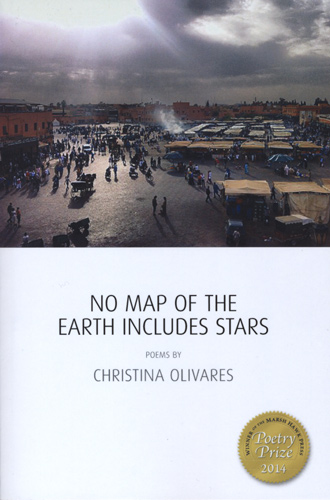 The Marsh Hawk Press Poetry Prize is awarded annually, with a first prize of $1,000 and publication. During this past May, the 2014 winner was published: No Map of the Earth Includes Stars by Christina Olivares.
The Marsh Hawk Press Poetry Prize is awarded annually, with a first prize of $1,000 and publication. During this past May, the 2014 winner was published: No Map of the Earth Includes Stars by Christina Olivares.
Also the winner of YesYes Books’s 2014 Vinyl 45 Chapbook Competition with her chapbook Petition, Olivares has poems published or forthcoming in Five Quarterly, decomP, Vinyl Poetry, and PALABRA, among others.
Check out the Marsh Hawk Press website for more information about No Map of the Earth Includes Stars or pick up a copy.
Spread the word!
Ricochet Review
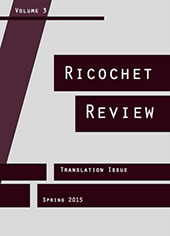 Student poets guided by faculty and editorial editors at Chicago’s Von Steuben Metropolitan Science Center comprise the editorial board of Ricochet Review, an annual poetry magazine that strives to publish both established and emerging writers who work in poetry and/or poetry translations from various languages and various forms of art. The newest issue (#3) features translation from both underrepresented and major languages, as well as through ekphrasis.
Student poets guided by faculty and editorial editors at Chicago’s Von Steuben Metropolitan Science Center comprise the editorial board of Ricochet Review, an annual poetry magazine that strives to publish both established and emerging writers who work in poetry and/or poetry translations from various languages and various forms of art. The newest issue (#3) features translation from both underrepresented and major languages, as well as through ekphrasis.
Ricochet Review is unique among literary magazines because of its “Apprentice Poet and Master Poet Mentorship Exchange.” This is an opportunity for high school poets to hone their craft through a guided, workshop-style collaboration between experienced, published, and talented master poets, who understand the art of poetry and how to convey it. High school students who wish to be mentored should highlight their interest in their cover letter when submitting their poems. The editorial board will then contact chosen participants.
Ricochet Review is currently accepting national and international submissions from high school students, college students, and non-students. The theme for their next issue: “Macabre and Grotesque.” The editors write, “We are looking for any type of poetry and translation directly or indirectly inspired by the macabre and/or grotesque.” The reading period ends February 1, 2016.
Spread the word!
Poetry Resource for Teachers
The Teacher’s Lounge on the League of Canadian Poets website offers some great resource essays and lesson plans:
Encouraging Amazing Writing by Dawna Proudman
Inspiring Writing that Makes You Stand Up and Cheer by Dawna Proudman
Performing your Work: Finding the Actor Inside of You by Penn Kemp
Get Rhythm: teaching students to hear rhythm and metre by Katherine Parrish
Keep it Simple: Concrete Imagery in Poetry by Michael Mirolla
Dispelling the 5-7-5 Myth: A Haiku Lesson for Elementary Students by Naomi Beth Wakan
Canadian Poets Across the Curriculum: Al Purdy and the Dorsets by Kathryn Bjornson
Canadian Poets Across the Curriculum: Fred Wah and Joy Kogawa by Kathryn Bjornson
Digital Spaces, Reading, and Poetics by Aaron Tucker
Identity and Autobiography by Aaron Tucker
Teaching Form Poetry by Yvonne Blomer
Spread the word!
Writing Dialogue – Or Not
 Writer Samsun Knight explores the role of conversational dialogue in fiction: “…in reality, nobody ever talks to anyone else. What speech actually achieves is a communication between one person and that person’s idea of the other. Most of the time there is no difference, no discernible difference, between such verisimilitude and the truth. But the best dialogue will manifest this disparity in subtle, slender ways. It will show how, in speaking, we fail to speak.”
Writer Samsun Knight explores the role of conversational dialogue in fiction: “…in reality, nobody ever talks to anyone else. What speech actually achieves is a communication between one person and that person’s idea of the other. Most of the time there is no difference, no discernible difference, between such verisimilitude and the truth. But the best dialogue will manifest this disparity in subtle, slender ways. It will show how, in speaking, we fail to speak.”
Read the rest of his commentary in Glimmer Train Bulletin #102 along with other craft essays from authors recently published in Glimmer Train Stories.
Spread the word!
It’s Time! August Poetry Postcard Festival!
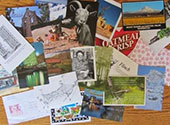 Paul Nelson, poet and lead organizer of the August Poetry Postard Festival has sent the first update for this year’s event!
Paul Nelson, poet and lead organizer of the August Poetry Postard Festival has sent the first update for this year’s event!
For you newbies, the August PoPo Fest goes like this: You sign up. You get a list of 31 names/addresses of other people who signed up. Starting late June, you write a poem a day on a postcard and mail it off to the next person on the list, so by the end of the month, you will have (hopefully) written and sent 31 poems and (hopefully) received 31 poems.
The poems are not supposed to be pre-written or something you’ve been working on for months. This is an exercise is the spontaneous, the demanding, the gut-driven, the postcard inspired – whatever it is that gets you to write once a day, each day, and send it off into the world.
I’ve done this event since it began, and it is now in its ninth year! I don’t always keep to a poem a day; sometimes I get ahead one day, or catch up another, with several poems in one day. But I try my best. The event does get me thinking of poetry in my every day, when I rarely have time for it, and writing it down – something I have time for even more rarely.
I’ve received poems from across the state, the country and around the globe. I’ve gotten postcards made from cereal boxes, some with gorgeous original artwork, and lots of the lovely tacky tourist cards from travel destinations. I have cards from “famous” poets, and some who have since become more famous, and some never signed, so I’ll never know, and it hardly matters. I’ve gotten poetry. Sent to me directly. From strangers. Lovely, strange, absurd, and funny. Poetry.
It’s an amazing event, and I hope you will take the challenge and join in this year. For the first time EVER, the organizers have decided to charge a nominal fee for the event ($10). I can only imagine the amount of work it is to run this (with up to 300 people participating), and keeping up virtual space to promote it. I’m not dissuaded by the fee, knowing the extraordinary event that it is, and knowing I’ve spent 100 times that on conferences from which I’ve gotten a great deal less inspiration…
So, please writers, wanna-bes and needs-a-kick-in-the-arsers, poetry lovers, postcard lovers – this event is for you. Join us!
Spread the word!
Gulf Coast 2014 Barthelme Prize Winners
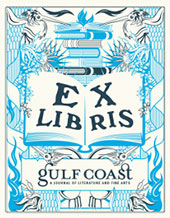 The winner and honorable mentions of the 2014 Barthelme Prize are featured in the Summer/Fall 2015 issue of Gulf Coast:
The winner and honorable mentions of the 2014 Barthelme Prize are featured in the Summer/Fall 2015 issue of Gulf Coast:
2014 Barthelme Prize
Amy Hempel, Judge
Winner
Emma Bolden, “Gifted”
Honorable Mentions
Patty Yumi Cottrell, “No One Makes Plans”
Susan Lilley, “Delmonicos”
The Barthelme Prize for Short Prose is open to pieces of prose poetry, flash fiction, and micro-essays of 500 words or fewer. The contest awards its winner $1,000 and publication in the journal. Two honorable mentions will receive $250, and all entries will be considered for paid publication on the Gulf Coast website as Online Exclusives.
Spread the word!
Lamar York Prize Winners
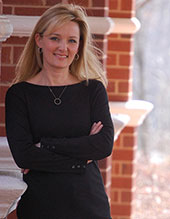 The Chattahoochee Review Spring 2015 includes the winners of the Lamar York Prizes for story, judged by David James Poissant, and essay, judged by Marcia Aldrich. Each winner receives $1000 and publication. This year’s recipients are Joel Wayne for “Brother’s Keeper” (fiction) and Amy Clark (pictured) for “The Rocks” (nonfiction). A complete list of finalists can be found here.
The Chattahoochee Review Spring 2015 includes the winners of the Lamar York Prizes for story, judged by David James Poissant, and essay, judged by Marcia Aldrich. Each winner receives $1000 and publication. This year’s recipients are Joel Wayne for “Brother’s Keeper” (fiction) and Amy Clark (pictured) for “The Rocks” (nonfiction). A complete list of finalists can be found here.
Spread the word!
Books :: John Simmons Short Fiction Award
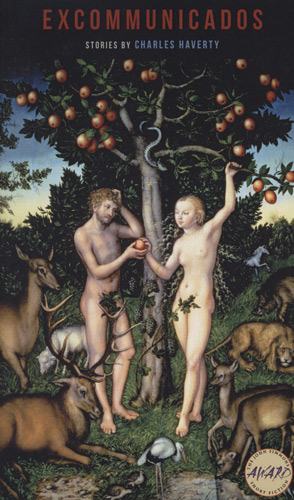 The John Simmons Short Fiction Award is open to any writer who hasn’t previously published a volume of prose fiction. Charles Haverty is the 2015 winner with his forthcoming collection Excommunicados.
The John Simmons Short Fiction Award is open to any writer who hasn’t previously published a volume of prose fiction. Charles Haverty is the 2015 winner with his forthcoming collection Excommunicados.
From the University of Iowa Press’s website: “By turns haunting, hilarious, and heartbreaking, Charles Haverty’s debut collection charts the journeys of men, women, and children cast out of familiar territory into emotional terra incognita where people and things are rarely what they seem. . . . There are secrets at the center of each of these daring and original stories—secrets that separate these characters from one another but grow in the mind and the heart, connecting them with all of us.”
To be available in October 2015, copies of Excommunicados can be preordered from the University of Iowa Press website.
Spread the word!
Quiddity: Some Changes
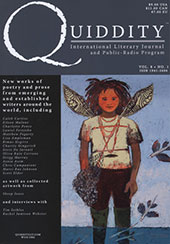 Quiddity, the international journal and public radio program enters into its eighth year with a couple notable changes. Managing Editor Jim Warner will be handing over the role to John McCarthy, and the partnership with Benedictine University at Springfield has come to close. Quiddity will continue with a new relationship with NPR member/PRI affiliate WUIS, Illinois Public Radio’s hub-station. As Warner writes, “Sharing our contributors’ work with the public-radio audience is a crucial element to our mission at Quiddity and we look forward to sharing more work with you.”
Quiddity, the international journal and public radio program enters into its eighth year with a couple notable changes. Managing Editor Jim Warner will be handing over the role to John McCarthy, and the partnership with Benedictine University at Springfield has come to close. Quiddity will continue with a new relationship with NPR member/PRI affiliate WUIS, Illinois Public Radio’s hub-station. As Warner writes, “Sharing our contributors’ work with the public-radio audience is a crucial element to our mission at Quiddity and we look forward to sharing more work with you.”
Spread the word!
Sea Level Rising
I read half of the poetry in John Philip Drury’s newest book of poems Sea Level Rising while situated on a large towel on St. Augustine Beach along the Atlantic in Northern Florida. It was the ideal setting for contemplating as Drury expressed his love for the sights and sounds of the ocean. “I miss the rising tides,” he reminisces in the book’s title poem, “that bash the docks / and spatter brackish water in my face.” Continue reading “Sea Level Rising”
